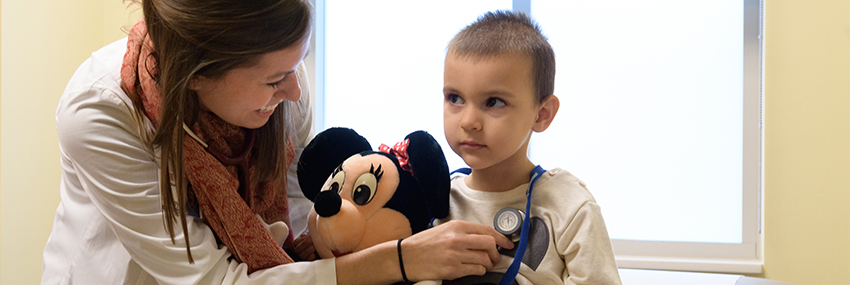
Clinicals
Requirements Regarding Preceptorships, Internships and Practicums
630 clinical preceptorship-supervised hours of advanced practice nursing are required for the pediatric nurse practitioner program, as prescribed by the American Academy of Nurse Practitioners (AANP), the American Nurses Credentialing Center (ANCC) and the Pediatric Nursing Certification Board.
The PNP program’s 630-hour preceptorship is comprised of three preceptorship courses, clinical experiences in the Advanced Health Assessment course and a hands-on workshop in suturing. The preceptorship sites include: HMOs, physician offices, specialty offices, Federally Qualified Health Centers, community clinics, community events and other community agencies.
Clinicals
The School of Nursing maintains over 100 clinical contracts with healthcare settings in Tippecanoe and surrounding counties. The program allows nurses to learn in or near their rural home communities during the clinical preceptorship component of the program, rather than traveling to urban areas.
Students will have the opportunity to complete their clinical hours in one of the following practice settings each semester: the Nursing Center for Family Health (NCFH) in Lyles-Porter Hall; North Central Nursing Clinics with locations in Delphi, Monon, Wolcott and Burlington; Indiana University/Arnett Clinic primary care offices; Riggs Community Health Center; St. Elizabeth Medical Center; Riley specialty clinics, Peyton Manning primary care and specialty clinics; Wabash Valley Hospital; state and local public health departments; state and federal legislative and homeland security offices.
Policy for Student Rotations
Students are provided with a wide variety of clinical experiences with infants, toddlers, school-aged children, adolescents and young adults. The School of Nursing acquires and maintains contracts with precepting agencies. Precepting agencies include rural health nurse-managed clinics, community outpatient clinics in underserved areas, private general practice offices, specialty offices and primary healthcare settings.
All students spend at least one semester in a rural clinic that serves underserved populations, and one semester in a private clinic. All non-faculty preceptors are licensed to practice in the state of Indiana, have experience in pediatrics, and are nationally certified nurse practitioners, licensed physicians, or subspecialty physicians with specialty board certifications. All students spend at least one semester with a pediatric nurse practitioner. There is close supervision of students by clinical NP faculty. Faculty make at least two visits per semester to the students’ clinical site. Indirect supervision by faculty members includes evaluating the student’s progress and serving as liaison to community agencies. No more than six students at one time are indirectly supervised. Direct supervision by faculty members (who are preceptors) includes no more than two students at any given time. Non-faculty nurse practitioners and physicians precept only one student at a time in the clinical area.
